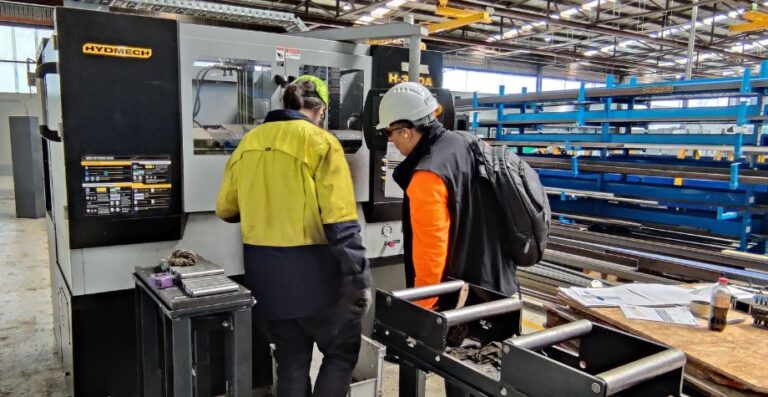WHAT DOES A SHEET METAL WORKER DO?
cAREER pATHS IN aUSTRALIA

At Power Machinery, we’ve worked alongside the sheet metal and fabrication industries for more than 50 years. This guide explains exactly what these workers do, whether they’re in demand, how much they earn, and how you can get qualified if you’re starting out.
wHAT DOES A SHEET METAL WORKER DO?
A sheet metal worker specialises in working with thin, flat sheets of metal — usually under 6mm thick. They cut, bend, and assemble sheet metal into products or components used in construction, manufacturing, and everyday appliances.
Common tasks include:
Cutting and shaping sheet metal using shears, guillotines, press brakes, and CNC machines.
- Assembling components through welding, riveting, or bolting.
Installing finished products such as ductwork, cladding, or roofing.
Reading technical drawings and blueprints to ensure accuracy.
Measuring and marking out jobs before fabrication.
In modern workshops, sheet metal workers often use advanced machinery such as fibre lasers, plasma cutters, and CNC press brakes — technology that improves speed and precision.
wHAT DOES A sTEEL fABRICATION wORKER DO?
While sheet metal workers deal with thin materials, steel fabrication workers focus on heavier, structural materials like beams, columns, and plates. Their work underpins Australia’s construction, mining, and infrastructure projects.
Typical responsibilities include:
Fabricating steel structures such as staircases, bridges, and frameworks.
Welding and assembling heavy steel components.
Operating machines like section rollers, band saws, and hydraulic presses.
- Maintaining equipment to ensure safe, efficient operation.
Quality checks to meet Australian Standards for safety and durability.
Steel fabrication workers often work in larger teams, handling bigger projects that require cranes, rigging equipment, and complex planning.
Are sheet metal workers in demand in Australia?
-
Infrastructure projects → Major government spending on transport, renewable energy, and housing requires skilled fabricators.
-
Manufacturing sector resilience → From food processing to defence, many industries rely on sheet metal components.
-
Ageing workforce → As experienced tradespeople retire, opportunities are opening up for younger workers.
-
Specialist skills → Workers trained on CNC machinery, fibre lasers, and robotic welding are especially sought after.
According to Jobs and Skills Australia, sheet metal trades workers are expected to experience stable to moderate growth, with demand strong in states like New South Wales, Victoria, and Queensland.
how much does a sheet metal worker make in australia?
Wages vary depending on location, experience, and qualifications, but here are general figures:
-
Entry-level apprentices (1st year): around $20–25 per hour.
-
Qualified sheet metal worker: $30–40 per hour.
-
Experienced or specialist workers (CNC, advanced welding): $40–50+ per hour.
On average, a qualified sheet metal worker in Australia earns between $65,000 and $90,000 per year, with overtime and site allowances pushing that higher in certain industries (e.g., mining or defence).
Steel fabrication workers often earn slightly more due to the heavier nature of their work and additional skills in rigging, crane operation, or coded welding.
How to get Qualified as a sheet metal worker
In Australia, sheet metal workers usually complete a trade apprenticeship.
Typical Pathway:
School leaver entry
Complete Years 10–12 (maths, design & technology, or engineering studies are useful).
Apply for an apprenticeship with a fabrication company.
Apprenticeship
Complete a Certificate III in Engineering – Fabrication Trade (MEM30319) at TAFE or another RTO.
Takes around 3–4 years, combining on-the-job training with formal study.
Licensing and tickets
Depending on the work, additional certifications may include:
White Card (construction site safety).
High Risk Work Licence (for forklifts, cranes).
Welding qualifications (AS/NZS 1554 compliance).
For adults transitioning from another career, Recognition of Prior Learning (RPL) may shorten the process if you already have relevant experience.
What experience helps a sheet metal worker?
For new graduates and career changers, useful experience includes:
-
Work experience in a workshop → even basic exposure to tools and machinery helps.
-
Part-time labouring or assisting tradespeople → builds practical knowledge.
-
Computer-aided design (CAD) familiarity → increasingly valuable as fabrication becomes more automated.
-
Problem-solving roles → whether in retail, hospitality, or another trade, the ability to follow instructions and adapt is transferable.
Employers value candidates who are hands-on, reliable, and willing to learn, even if their experience is outside fabrication.
What qualities make a good sheet metal worker?
Beyond technical skills, the following personal qualities are highly regarded:
Attention to detail → precision is critical in cutting and assembly.
Physical fitness → the work can involve lifting, bending, and standing for long periods.
Mathematical ability → measuring, angles, and geometry are everyday tasks.
Communication skills → working as part of a team on large projects.
Commitment to safety → following procedures in environments with heavy machinery.
Adaptability → ability to learn new technology such as CNC software or laser cutting systems.
The role of advanced machinery in the trade
Modern sheet metal work is no longer just about hammers and shears. Equipment like fibre lasers, CNC press brakes, metal bandsaws and section rollers are standard in advanced workshops.
At Power Machinery, we supply equipment from world-leading manufacturers such as Ermaksan, Hydmech, and Cidan, helping Australian workshops stay competitive. Workers trained on these machines are more valuable to employers and enjoy better long-term career prospects.
Conclusion: a sOLID cAREER cHOICE
Whether you’re a school leaver looking for your first trade, or someone ready for a career change, becoming a sheet metal worker or steel fabrication worker offers:
-
Strong demand across Australia.
-
Wages well above the national average once qualified.
- A clear training pathway through apprenticeships.
-
The chance to work on projects that shape the nation’s infrastructure and industry.
If you’re interested in fabrication, start by contacting local employers, TAFE colleges, or industry associations. And if you’re already in the trade, remember that the right machinery makes all the difference — which is where Power Machinery has supported Australian workshops for over 50 years.
To learn more about the equipment driving Australia’s sheet metal and fabrication industries, visit Power Machinery.